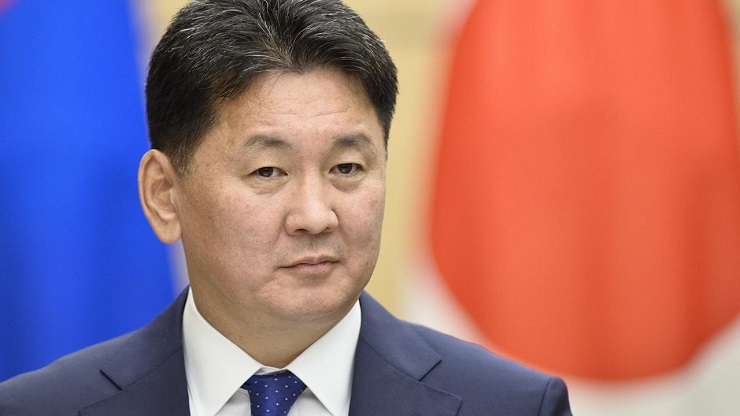On September 23, the President of Mongolia, Ukhnaagiin Khürelsükh took part in a full session of the UN General Assembly, in which he set out Mongolia’s position on various current issues in international relations.
In his speech, he focused particularly on the topic of cooperation between Mongolia and the United Nations. He pointed out that,
“by joining the UN in 1961, Mongolia secured its independence and sovereignty, and became a fully-fledged member of the global community. Today, the Mongolian people are celebrating the sixtieth anniversary of their nation’s accession to the UN.”
As for practical cooperation with the United Nations, the Mongolian President emphasized that in the field of peace and security, Mongolia had declared its territory a nuclear-weapon-free zone in 1992 and is working tirelessly to maintain this status to this day. Mongolia aims to make use of its strategic geographical position by becoming a transit link between Asia and Europe. Since 2002, more than 20,000 Mongolian peacekeepers have participated in 13 UN missions on three continents. “In relation to its population and the size of its military, Mongolia’s has contributed more to UN peacekeeping missions than any other nation,” he said.
In his personal meeting with the UN Secretary-General on September 21, Ukhnaagiin Khürelsükh indicated that Mongolia is pursuing a policy of expanding its participation in UN peacekeeping operations and has registered four military units in the UN’s Capacity-building System. He also expressed interest in sending another contingent of troops in the near future. He expressed hope for UN support for his proposal to create an International Peacekeeping at the Mongolian Armed Forces’ Tavan-Tolgoi Training Center, as part of his peacekeeping initiative. President Khürelsükh also noted that Mongolia is working to increase the proportion of women participating in UN peacekeeping operations to 15%, in accordance with the UN Security Council’s resolution on women, peace and security. In view of this goal, he called for support and cooperation in organizing an international conference on women’s participation in peacekeeping operations, to be held in Ulaanbaatar next year.
For his part, UN Secretary-General Antonio Guterres thanked Mongolia for its active involvement in the UN’s work, noting that cooperation was expanding year by year, and promising that the UN would support Mongolia.
Mongolia joined the UN on October 27, 1961 and, as a full member, it in entitled to join the UN system partner organizations and accede to international treaties and agreements. This has enabled Mongolia to expand its foreign policy and receive assistance and support from the United Nations as a whole and other individual Member States.
In 2014, Mongolia’s leadership mentioned the possibility of that it might seek election as a non-permanent member of the Security Council in 2022.
In addition to its 5 permanent members, the UN Security Council also has 10 non-permanent members, selected from among the UN Member States for a two-year period – and there is never any shortage of candidates for such seats. In order for a country to obtain a non-permanent seat on the Security Council, its candidature must be supported by two thirds of the votes cast by of the current Member States. The preparations for such a vote and the nomination of candidates usually begins ten years before the election, and the countries in question make a great effort to gain the support of the international community.
It is therefore significant that in his speech at the 76th session of the UN General Assembly, Mr. Khürelsükh made no mention of his country’s hopes to obtain a non-permanent seat on the UN Security Council.
This reticence could perhaps be explained by the fact that Mongolia’s new government has given up its claim to such a seat in favor of another country. That country could quite possibly be Japan, with which Mongolia has been developing particularly friendly relations in recent years, seeing it as its “third neighbor”, and which applied for a seat as a representative of the Asian states at the 74th session of the UN General Assembly in 2019.
During the severe crisis which raved the Mongolian economy in the early 1990s, Japan was the country’s main supporter, providing it with humanitarian aid, financial aid and low-interest loans. For Mongolia, Japan represents an opportunity to diversify its foreign trade and sources of investment. Japan is currently the only country with which Mongolia has signed a free trade agreement. In recent years Japan has been Mongolia’s third largest trading partner, with more than half of all the country’s cars being imported from Japan. Bilateral trade is dominated by imports of Japanese goods into Mongolia, although the volume of direct Japanese investments in the Mongolian economy has not yet met Ulaanbaatar’s expectations. Scientific and cultural contacts also play a significant role in the development of Mongolian-Japanese relations, with Japanese culture increasing popular in Mongolia, which has significantly contributed to the success of Mongolian sumo wrestlers performing in Japan.
However, perhaps one of the most notable results of Tokyo’s active policy has been the transformation of Japan’s image in Mongolia. Just a few decades ago Japan was seen as a threat, with memories of Japan’s attempted annexation of the MPR still raw, but it has since offered large-scale financial support to the Mongolian economy and encouraged the development of cultural ties, and as a result it is now seen as a positive influence by both the Mongolian political elite and the country’s population as a whole.
Vladimir Odintsov, political observer, exclusively for the online magazine “New Eastern Outlook”.

